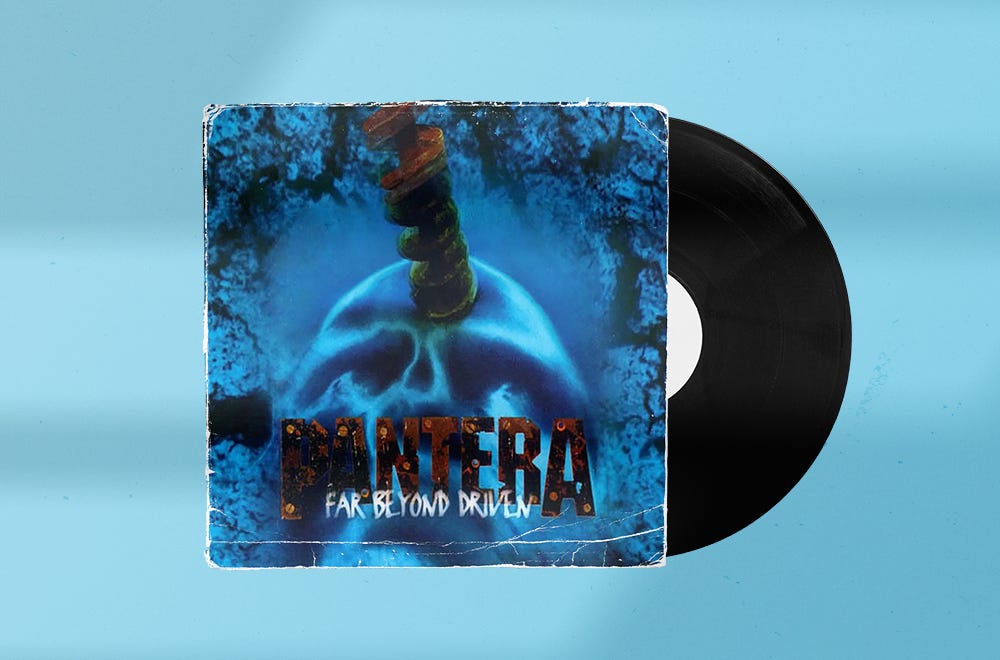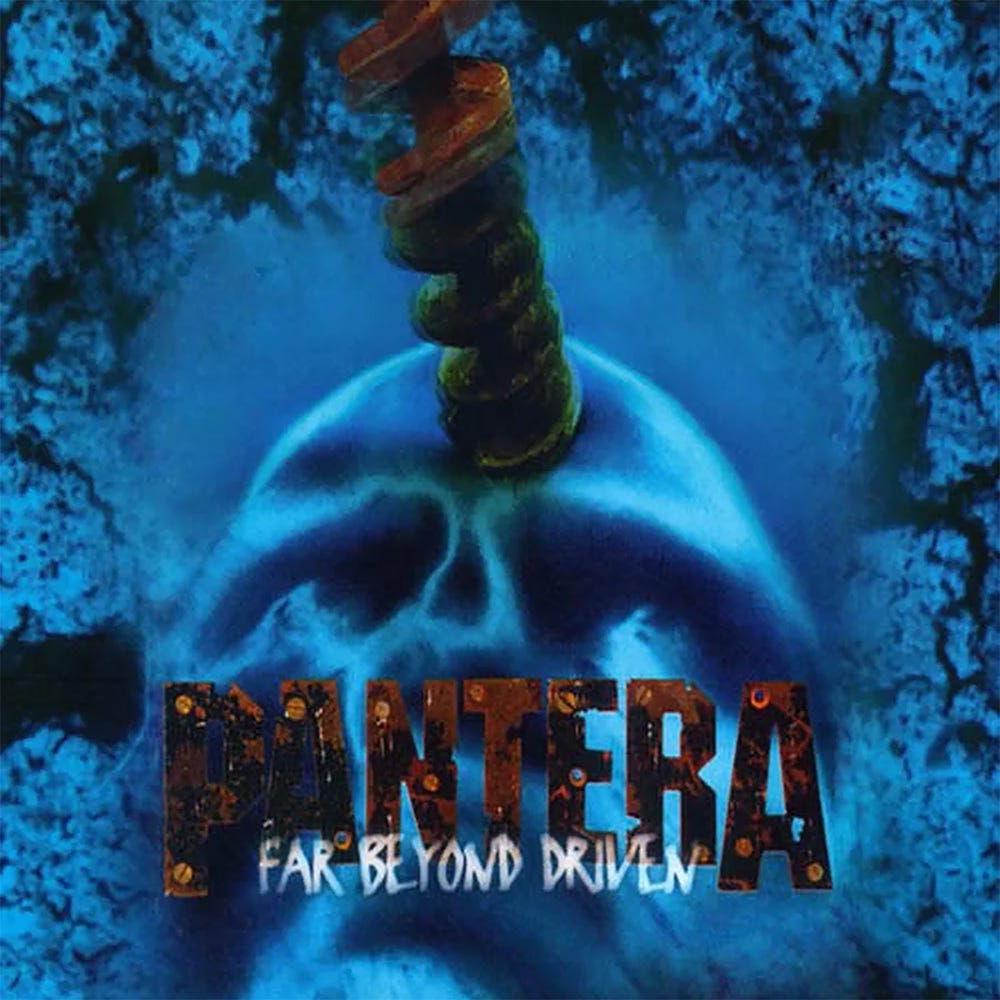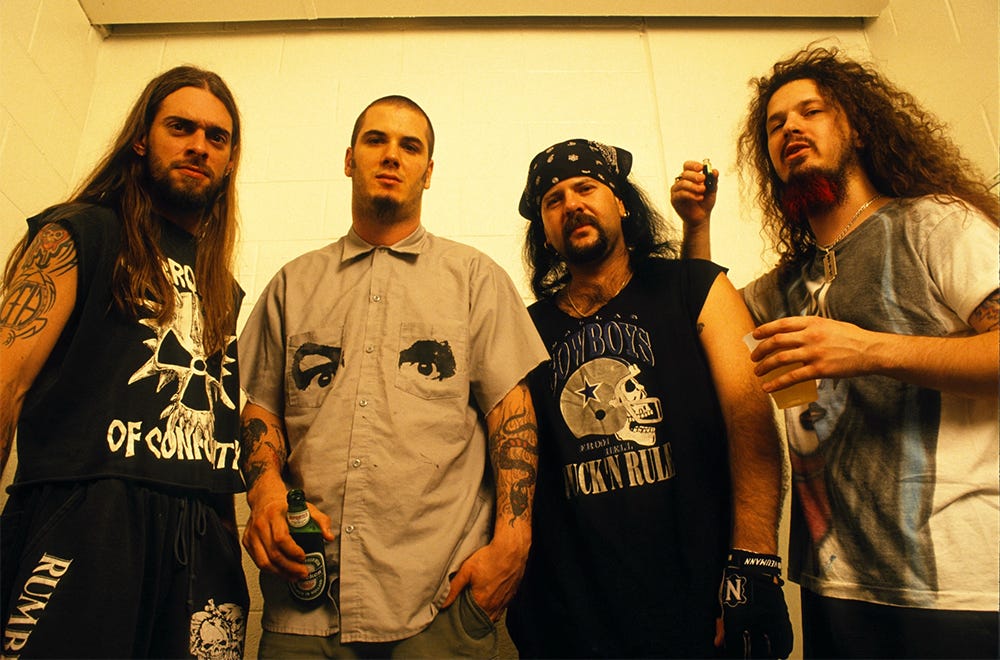Deep Cuts #17: Pantera – 'Far Beyond Driven'
Balls-out, heavy metal groove from the Lonestar State.
Artist: Pantera
Album: Far Beyond Driven
Release: March 22nd, 1994
Label: East West
Listen here: Spotify | YouTube
Like most influential heavy acts of the twentieth century, my relationship with Pantera has taken the form of a reverse chronology. By the time the Texan metal powerhouse had released their seminal albums—1990’s now-iconic Cowboys from Hell and its equally revered 1992 follow-up Vulgar Display of Power—I was only four years old. At this point in my existence, the heaviest thing I knew was the theme for Thomas The Tank Engine. (Still a total banger, by the way.)
I first came across the band through “Revolution Is My Name,” a single taken from the group’s ninth and final studio LP, Reinventing the Steel (2000), which was featured on a CD compilation for Channel V’s Heavy Shi[f]t program. While the track was undeniably heavy and anthemic in all the right places, it didn’t stick with me like other selections from big names like Slipknot, Fear Factory and Rob Zombie. Plus, at this post-Y2K point in history, the CD-ROM bonus content was far too exciting. (“Woah! 240p music videos AND a screensaver?!?”)
So, when the band officially broke up in 2003, and guitarist “Dimebag” Darrell Abbott was tragically shot and killed during a Damageplan show in 2004, any chance I had of catching on to Pantera as an active musical force was gone. The only option I had left was to work my way backwards. Which, coincidentally, is how I discovered the visceral, headbang glory of 1994’s Far Beyond Driven.
Of all the details surrounding Pantera’s seventh studio album, my favourite trivia tidbit concerns the group’s eventual choice for the cover artwork.
Unlike the sepia-toned bar room shenanigans of Cowboys from Hell, or the nearly monochromatic fisticuff aggression of Vulgar Display of Power, the cover for Far Beyond Driven is bright and incisive. The neon x-ray colour palette immediately directs the eye and invites further interrogation; the image of a drill driving into a person’s skull perfectly matches Pantera’s sonic profile in the mid-90s: brutal, painful, and ruthlessly mechanical.
However, this iconic image was not the band’s first choice. As drummer Vincent “Vinnie” Paul Abbott told Vanyaland in 2014, the original artwork featured said drill going right into someone’s unfortunate posterior:
“The original thought was ‘metal up your ass,’ you know? And like you said, in 1994, heavy metal was uncool, and we wanted to be as metal as we could. The label agreed with us and then came back three days later and said, ‘Uhhh…we can’t get this into Walmart, Target and retail, and it’s gonna kill us.’ So we got back with the guy who did the artwork, Dean Karr, and he did the one with the drill in the head, which signifies the same thing.”
Now, while I wholeheartedly agree with Paul’s sentiment here, I do think the label’s better judgment won out. On release, Far Beyond Driven debuted at #1 on the Billboard 200, quickly becoming the group’s fastest-selling album and their second consecutive platinum release. The album was wildly successful and not only cemented Pantera’s status as heavy metal legends—it made them a household name. I’m not sure if the literal imagery of “metal up your ass” would have had the same knock-on effect.
That said, the band’s eventual choice of cover indicates a facet of the album that I feel is often overlooked. Despite the undeniable brutality on display, there’s a troubled, meditative core beneath the macho posturing, lizard-brain riffs, and furious assaults that warrants further scrutiny.
In the weeks before the album’s release, “I’m Broken” was released as the lead single. Perhaps more than any other track in the band’s hefty back catalogue—excepting absolute monsters like “Domination” and “Walk”—this song is pure, unadulterated Pantera.
Each musical element announces itself like sonic DNA: frontman Phil Anselmo’s stop-start verse flow, effortlessly transitioning guttural roars into righteous rebel yells; Dimebag’s blues-inflected riffage, pairing indomitable crunch and gain with neck-breaking swing and irresistible groove; Paul and bassist Rex Brown locking together to form an unstoppable rhythmic steamroller. (Fun fact: I cannot listen to this song without immediately thinking of this video. I feel no shame, and I make no apologies for it.)
As Anselmo explained to Rolling Stone in 2014 for the record’s 20th-anniversary milestone, the band were listening to The Melvins and Black Sabbath (yes, that is a “Planet Caravan” cover in the tracklist), so their natural inclination when moving into LP #7 was to slow things down, focusing on composition over instrumental flash and needless complexity. And with their earlier sound transitioning from glam metal to thrash and proto-death metal, Far Beyond Driven would further solidify Pantera’s approach to intense, headbang-focused groove metal.
Lyrically, however, “I’m Broken” is one of many tracks on the record that functioned as an emotional bloodletting for Anselmo, reflecting the frontman’s newfound vulnerability and self-awareness in the face of the group’s growing profile, touring commitments, and mounting substance abuse issues.
Speaking with Loudwire, Anselmo describes how “Hard Lines, Sunken Cheeks” foreshadowed his fear of change in the face of addiction, where the threat of death hung over him like a “chokehold”. The track’s lengthy seven-minute runtime and Dimebag’s melancholic guitar wail mirror Anselmo’s inner darkness and torment, intensifying existential dread with brutal bursts of heavy metal fury. Likewise, the midsection of “Shedding Skin” drops into a clean melodic section contrasted against spoken word vocals, as Anselmo denies himself affection and desire in the face of self-loathing and destruction.
Alongside the more immediate and detrimental effects of a hard-rockin’ lifestyle, Far Beyond Driven also saw Anselmo reflecting on familial ties and his predilection for white-hot flashes of anger. Album opener “Strength Beyond Strength” is a classic example of a “puffing the chest up” macho rager. The track launches into a quick tempo metal meltdown, with lightning riffage from Dimebag, pummeling percussion from Paul, and Anselmo’s charged lyrical barbs against modern society’s definition of ‘success’ at the End of History:
“There is nothing/
No education, no family life to open my arms.
You'd say that my job is today/
Yet gone, tomorrow I'll be broke in a gutter.I know the opinion/
A broken record.
Fuck you and your college dream/
Fact is we're stronger than all.”
And that’s just the first thirty seconds of the record—things only get more intense from there. “Use My Third Arm” is a self-described, wild “temper tantrum” that even Anselmo can’t pin down, unable to recall after thirty years just what exactly he was so pissed off about. But it works nonetheless, with Brown and Paul stomping away with almost robotic glee.
Elsewhere on the record, blood-pumpers like “25 Years” and “5 Minutes Alone” make things expressly personal. The former is a winding, serpentine exorcism through resentment and Anselmo’s looming daddy issues, while the latter acts as a middle-fingered retort to arrogant fans and wannabe tough guys.
Thankfully, however, Far Beyond Driven isn’t all dysfunctional family drama and attitudinal bluster. When the band come together for something heady and intricate, the results are often astounding.
“Slaughtered” takes aim at organized religion, with Anselmo’s “distorted” fusion of differing ideologies combining youthful hostility with social commentary. “Throes of Rejection” is borderline Sartrean in its analysis of sex as a bodily impulse and the rejection of self in the face of carnal desires. I’m not sure if Jean-Paul ever thought to pair the term “sugarhole” with a sliding, down-tuned beatdown, though… (maybe he should have).
Meanwhile, the screeching pick scrapes and factory floor percussive drops of “Becoming” undergird the track’s more subversive philosophical subtext. Reading Anselmo’s lyrics between each piercing solo and six-string squeal, one finds a reflection on Pantera’s existence as a whole—their rising popularity, the cultural context of the 90s, the evolving landscape of metal and alternative music—that morphs into a firm rejection of commodification for the temporary commercial aspirations of the peers (*cough* “Metallica” *cough*).
As Rolling Stone put it for their list of the “100 Greatest Metal Albums of All Time,” in which Far Beyond Driven slots in at a well-deserving #39 (noticeably behind Vulgar Display of Power’s comfortable #10 position):
“To this day, Far Beyond Driven stands as indisputably the most extreme effort to have reached the top spot on the Billboard 200, not to mention to have debuted in that position upon its release. Credit the album’s success to Pantera’s undeniable dominance of the metal landscape in the mid-Nineties, as well as, in the words of [Anselmo], their commitment to making a ‘balls-out heavy-metal record with no compromising.’”
And truthfully, that central conceit is what makes the record such a lasting success and a high watermark for the band’s storied yet troubled career. It earned the band their first #1 album, a Grammy nomination, while also tackling personal and social issues with honesty and relatable grit. (Not to mention a couple of absolute banger riffs to boot.)
You can find all of the albums in this series in the TPD // Deep Cuts playlist.




